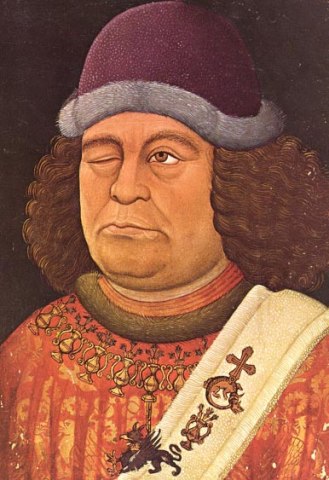B. Old and new songs

Fig. Oswald von Wolkenstein. Portrait of Oswald von Wolkenstein (1377/1378–1445) in manuscript „B“ (1432) of his songs. Universitäts- und Landesbibliothek Tirol, Innsbruck (A-Iu), without shelf-mark. With permission. The Tyrolean knight, who performed his own songs and had them written down with musical notation, combines the pride on his social status with artistic self-consciousness.
The essays and spotlight themes within the topic „Old and New Songs“ explore the cultivation of song from the 14th to the early 16th centuries. In addition to newly created songs, older songs remained in the repertoire and were passed on through, for example, techniques of pastiche, contrafactum (writing new texts to pre-existing songs) and translation. The repertoires of the „old masters“ of Minnesang and Spruch composition (13th and 14th centuries) were still partially known and were occasionally sung. The „Neidhart Phenomenon“ in particular - the dissemination of his compositions and related songs, farces and fables - was typical for Vienna and throughout the region. The Monk of Salzburg (fl 1380–1410) was very influential as an author of spiritual and secular songs, although it is not even certain who he was. The poet and singer Oswald von Wolkenstein (1377/78–1445) left an even more significant body of work; and his melodies, which were in part based on adopted models, have been preserved. Anonymous secular song texts of the time were published in the 19th century as „folk songs“, albeit unfairly: their transmission and individuality can, in specific cases, be more precisely determined. Singing in worship, domestic singing and liturgical drama complemented each other in the cultivation of the spiritual song repertoire. In courtly and bourgeois circles, the polyphonic performance of secular songs (courtly tunes) became common and regional musicians composed correspondingly demanding settings. As early as 1500, music prints played a part in the transmission of sacred and secular song repertoires.
The essays marked with * are not yet available online.
Traditionsbildungen des deutschen und lateinischen Liedes
Reinhard StrohmDas Phänomen „Neidhart“
Marc LewonGeistliche Lieder des Mönchs von Salzburg
Stefan EngelsDas geistliche Lied des 14. und 15. Jahrhunderts
Reinhard StrohmLieder in der Region Österreich, ca. 1450–ca. 1520
Nicole Schwindt